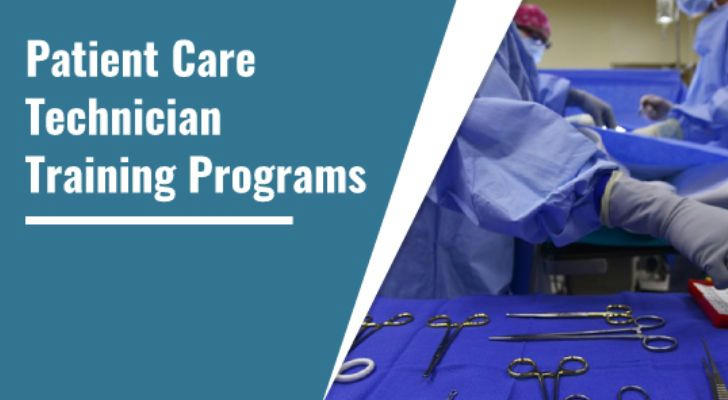Paid patient care technician training near me in 2025 – No experience required & Employment support
Want to start a healthcare career without a degree or student loans? Now, At, you can participate in paid patient care technician training supported by real employers and the government.
These programs combine hands-on experience, national certification, and job placement support — all while you earn a paycheck.

💰 Salary Outlook: Earn While You Learn — and After
🔹 During Training
Many trainees are hired in support roles (e.g., medical assistants or aides) while in the program:
- $15–$19/hour typical during training
- Flexible shifts to fit your class schedule
- Helps cover living expenses without student loans
🔹 After Certification
Once you pass the CPCT/A exam and get your credential:
- Full-time roles pay $20–$26/hour
- Annual salaries average $42,000–$47,000
- Higher wages in hospitals and metro areas
- Benefits include health insurance, PTO, and retirement plans
Compared to CNA jobs, certified PCTs make $8,000–$12,000 more per year and have better job flexibility.
📝 How to Apply for Paid PCT Training
- Search for local programs at job centers or community colleges.
- Confirm you have a high school diploma or GED.
- Ensure legal authorization to work in the U.S.
- Complete a simple application online or in person.
- Pass a basic background check and skills test.
- Apply for funding help if available.
- Enroll and start your training with flexible class times.
📚 Paid PCT program learning content
Paid PCT training blends classroom learning with hands-on clinical experience. You’ll work alongside professionals while you learn essential technical skills such as:
- Patient monitoring and care
- Electrocardiograms (EKG)
- Phlebotomy (drawing blood)
- Vital signs and safety protocols
Training is usually offered **day or evening **, on-site or online, designed to fit adults who need flexible schedules. The programs typically last 4 to 6 months.
Most importantly: You get paid while you train.
🏥 Official Support: Real Programs Backed by Employers and Government
These programs are not just classes — they are partnerships with employers who want trained workers.
Fresenius Medical Care
- Offers a structured paid PCT training program for dialysis technicians
- Provides paid internships and covers certification fees
- Graduates often move into full-time jobs immediately
Horizon Blue Cross / RWJBarnabas Health (NJ)
- Partners with community colleges for combined classroom and clinical training
- Offers paid work placements at hospitals and health centers
- Supports exam preparation and licensure processes
WIOA Funding Programs Nationwide
- Federally funded grants support low-cost training
- Many states have special healthcare tracks through local job centers
- Assistance with costs, child care, and transportation available for qualifying candidates
💼 PCT vs. CNA: What Sets Them Apart?
Many people start healthcare jobs as Certified Nursing Assistants (CNAs), but PCTs have more advanced skills, better pay, and wider opportunities.
| Feature | CNA | PCT (Patient Care Technician) |
|---|---|---|
| Job Duties | Basic patient care: hygiene, feeding | CNA duties plus EKGs, phlebotomy, labs |
| Work Settings | Mainly nursing homes | Hospitals, dialysis centers, clinics |
| Training Length | 4–6 weeks | 4–6 months (more comprehensive) |
| Certification | State CNA license | National CPCT/A credential (NHA exam) |
| Average Salary (US) | Around $32,000/year | $42,000–$47,000/year |
| Career Progression | Limited | Good foundation to pursue higher credentials through further study |
If you’re a CNA, upgrading to PCT adds skills and income. If you're new to healthcare, starting as a PCT gives you more tools and better pay from day one.
This pathway allows you to advance professionally by combining practical experience with further study and credentialing.
👩⚕️ Real Story: From Trainee to Certified PCT
“I was working retail and needed a career change. I found a PCT paid training program near me through the job center. During the 5 months of training, I worked part-time in a hospital and learned phlebotomy and EKG skills.
After passing the certification exam, I landed a full-time PCT role making $23/hour. Now I’m exploring options to continue my education to become an LPN. This program really changed my life.”
— Maria T., 30, Dallas, TX
🎯 Why Wait? Start Your Healthcare Career Now
The healthcare field needs more skilled technicians — and paid PCT training programs make it easy to start.
- Get paid while learning valuable, in-demand skills
- Earn a nationally recognized certification (CPCT/A)
- Enter healthcare roles with good pay and benefits
- Build a strong foundation for advanced nursing education
- Many programs offer tuition assistance through government grants
